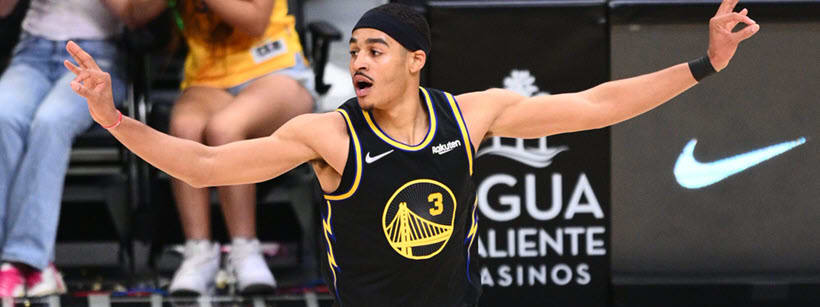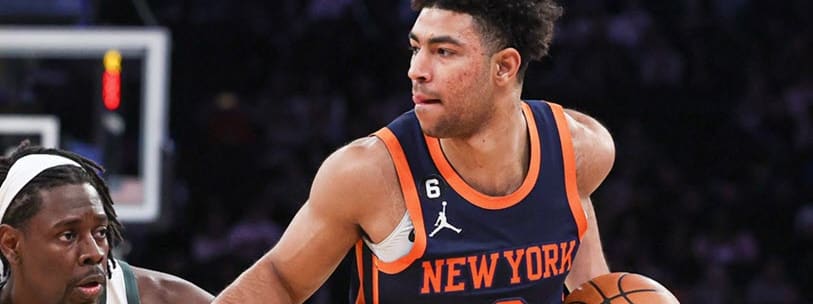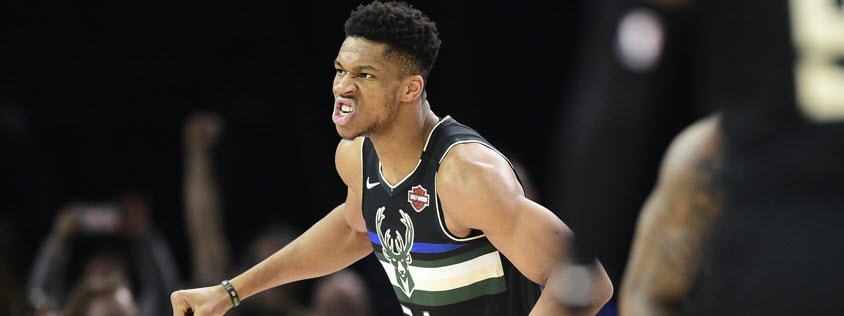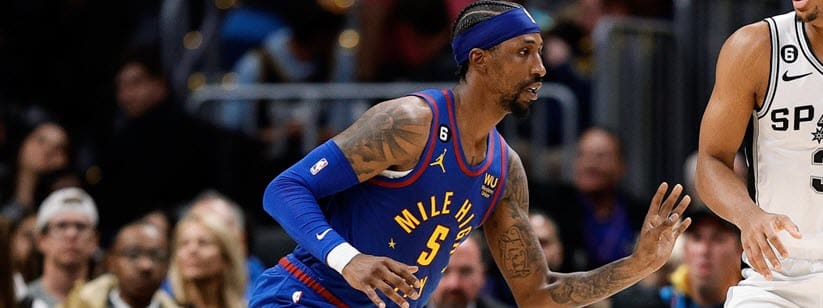Recent RotoWire Articles Featuring Kemba Walker
See More
The Knicks traded Walker, along with Alec Burks, to the Pistons this offseason to create cap space to sign Jalen Brunson. However, Walker and Detroit quickly reached a buyout agreement, and the veteran point guard has remained a free agent since the transaction. Walker appeared in 37 games for New York last year and averaged 11.6 points, 3.5 assists and 3.0 rebounds before being shut down for the remainder of the campaign due to a lingering knee issue. Washington (Monte Morris) and San Antonio (Tre Jones) are the only two teams in the NBA without a bonafide, long-term starter at point guard, but it remains unclear if either squad would be interested in bringing in an aging veteran with an injury-plagued past. Walker is only one year removed from averaging at least 19.0 points per game across six straight seasons, but the 2011 first-round pick offers little value to a team in the midst of a rebuild. Given his recent struggles, it's likely a contending team brings him in as a backup/emergency option during the regular season with the hope that he can revitalize his career as a score-first point guard off the bench.
After two challenging seasons in Boston, Walker returns home to NYC and the Knicks. In mid-June, 2020, the Celtics sent Walker and a 2021 first-round pick to Oklahoma City for Al Horford, Moses Brown and a 2025 second-round pick. Then late in the free agency period, OKC decided to buy out Walker and the Knicks quickly signed the speedy veteran. The pairing makes a lot of sense. New York lacked talent at the point guard position and had lots of cap space. Walker was an unrestricted free agent who can now revitalize his career on a playoff squad in his hometown. The big question with the 31-year-old veteran is health. With Boston, Walker missed 45 out of 144 regular season games. Most of those absences were due to a tricky knee issue that also forced him to miss two of Boston's five 2021 playoff games. Fortunately, with former-MVP Derrick Rose backing up Walker at point guard, New York can afford to rest Walker when need be. Coach Thibodeau loves to give his starters extended minutes and is also a huge Rose supporter. Those traits are in conflict when deciding whether Walker's 31.8 minutes per game from last season will go up or down. Regardless, on a Knicks squad anxious to find scoring punch in the backcourt, expect Walker to continue his aggressive shooting approach and his three-year average of 21.8 points per game. Keep in mind though, Walker hasn't averaged six or more assists per game since 2013-14 with Charlotte. If Walker's health can improve, the four-time All-Star could have a big season with the Knickerbockers.
For the first time since 2014-15, Walker struggled with injuries. Before 2019-20, the star point guard had only missed six games over four seasons. But in his first season with Boston, knee issues forced the nine-year veteran to miss 16 games during the pandemic-shortened 2019-20 season and slowed him down during the September playoffs. Per GM Danny Ainge, Walker "was definitely not himself" during the postseason. Also, Walker's 31.1 minutes per regular-season game was his lowest rate since his rookie season. So the question remains, how healthy will Walker be for 2020-21, especially after an abbreviated off-season? Boston brought in point guard reinforcements by signing 32-year-old Jeff Teague, a move that should help reduce Walker's workload. Fantasy wise, Walker still delivered excellent scoring and three-point production, solid steals and fantastic free throw shooting in 2020-21. Expect that to continue this season. But Walker's assists per game dropped to 4.8 per contest, which is concerning for a top-flight point guard. If Kemba can return to his 80-game form of years past, he'll be a fantasy draft day steal. But should his knee issues continue to flare up, he'll frustrate fantasy managers, particularly those in roto formats.
Kemba can finally relax a bit, as he will no longer have to carry his team's scoring load on a nightly basis, as he did with Charlotte. With the Celtics, he's now on a roster with more skill and depth at every position compared to last year's Hornets squad. The resulting statistical outcome could be fewer points, more assists and more efficient shooting percentages for the veteran point guard. This year, Walker has legitimate drive-and-dish options in Jayson Tatum, Gordon Hayward, Jaylen Brown and even Marcus Smart. And while it's fair to criticize Enes Kanter's defense, the 6-foot-11 center can catch most passes and finish with a strong layup. Fantasy owners should have concerns about Walker's minutes, however. In Charlotte, Walker was a lock for 34-plus minutes per contest. That should decline a bit with Boston, as coach Brad Stevens prefers a deeper rotation, resting his vets for the expected playoff run. But this is nitpicking. Walker is a model of consistency, averaging 80.5 games played over his past four seasons.
Walker has made the All-Star team each of the past two seasons, averaging 22.6 points, 5.5 assists, 3.5 rebounds and 1.1 steals. His name was all over the NBA leaderboards last season, ranking top-15 in minutes played (2,736), points (1,770), made three-pointers (231), made free-throws (361) and assists (444). This season, he may have an opportunity to climb those leaderboards even higher. Dwight Howard’s presence last season knocked Walker’s usage rate from 29.2 percent to 27.4 percent. The experiment was ultimately deemed a failure, however, with the Hornets opting to send Dwight Howard to Brooklyn, where he was waived and then signed with Washington. However, a high-usage and/or dynamic player was not added in his stead, leaving Walker with essentially the same crew he had in 2016-17, when he set a career high in usage. And, considering Walker is still relatively young (28 years old) and in a contract year with the Eastern Conference now weaker, it’s not a stretch to think he could be in store for a career year.
After making his first All-Star appearance in 2016, Walker has plenty to build off of going into his seventh season in the NBA. While he saw some solid increases in his numbers across the board, Charlotte won just 36 games last season, 12 fewer than their impressive 48-win season in 2015. It was no fault of Walker's, though, as he led the team with 23.2 points per game and added 3.9 rebounds, 5.5 assists and 1.1 steals per game. The 1.1 steals appear solid overall, but that's actually a major hit from a guy who averaged 1.6 steals per game across his previous four seasons. It's possible that the added focus, offensively, ultimately hurt him on the defensive side of the ball, as Walker had to do more for this team than he ever has throughout his career. With Dwight Howard in the fold, Walker now has a strong-finishing big man with which to work in the pick-and-roll, and Howard should also relieve some of the defensive responsibility. Walker also dominated the ball for Charlotte, posting a 29.1 usage rate, the only Charlotte player in the top-75 in the league in that statistic. That trend should continue, keeping Walker as a potential top-10 point guard in the majority of Fantasy leagues.
Walker rebounded in a major way last season after somewhat of a disappointing 2014-15 campaign. In his fifth NBA season, Walker averaged career highs in scoring (20.9 points per game) and rebounds (4.4), to go with 5.2 assists per game. He also shot a career-best 42.7 percent from the floor, while knocking down 37.1 percent of his three-point attempts, nearly four points better than his previous career high. While Walker missed out on his first All-Star selection, he solidified himself as one of the top point guards in the Eastern Conference. As he enters his age-26 season, Walker will look to prove his 2015-16 production wasn't a fluke, particularly from an efficiency standpoint. He might have to sacrifice a little usage with Michael Kidd-Gilchrist slated to return after missing most of the past season due to injury, but as a defense-first player, Kidd-Gilchrist's presence shouldn't affect Walker in an especially noticeable way.
In his fourth season, Walker produced 17.3 points on 15.8 field goal attempts, 3.5 rebounds, 5.1 assists, 1.4 steals, and 0.5 blocks in 34 minutes per game through 62 games. Forced to miss time after having surgery on his torn left meniscus, Walker posted his worst point, rebound, and assist averages since his rookie season and shot 39 percent from the field, 30 percent from distance, and 83 percent from the free-throw line. There's no denying the career 40 percent shooter needs to improve his scoring efficiency going forward. Still, Walker is coming off a career-best 1.6 turnovers per game, and the Hornets' devotion to adding outside shooters this summer may help open up the driving lanes for the 25-year-old smooth-handling sky-walker.
Finally getting some additional offensive help in Lance Stephenson, Kemba Walker could be poised for a breakout season. With a bevy of early draft picks (Cody Zeller, Noah Vonleh, P.J. Hairston) and free-agent acquisitions (Al Jefferson, Lance Stephenson, Marvin Williams) over the last two years, Walker finally has a competent team to play with, and his offensive numbers should continue to rise. Our projections see him averaging around 20 points with six assists and two steals per game. If he's in that ballpark, he'll be a top 10-15 fantasy player. Still just 24 years old, Walker should be just about ready to hit his prime and is more than likely going to have his best year in terms of advanced metrics (expect higher assist rate, true shooting percentage, and arguably a lower turnover rate). What it means for fantasy remains to be seen, but he's as big of a high-end sleeper as you'll probably find.
Cheer up, Bobcats fans. At least you have Kemba Walker. The ex-UConn star's sophomore campaign is one (of very few) reasons NBA fans in the Carolinas can be optimistic about the future. He played in all 82 games, averaging just under 35 minutes per game, and improved in every phase of the game last season, boosting his scoring to 17.7 ppg (from 12.1), his assists to 5.7 (from 4.4), his steals from 0.9 to 2.2 and his overall shooting percentage from a ghastly 37 percent to a respectable 42 percent from the floor – thanks in part to improved shot selection. Of course, he still has plenty of room for improvement – he turns the ball over far too often, and his three-point shot (32 percent) should probably be labeled "For emergency use only." The presence of free-agent signee Al Jefferson - an honest-to-goodness low-post scoring threat – should help diversify the Bobcats' offense a bit, but Walker is still the team's primary (only?) real option on the perimeter, and should continue to put up very good numbers.
Walker had a mostly lackluster rookie campaign for an awful Bobcats team, scoring 12.1 points per game on a horrid 36.6 percent shooting. The shooting should only improve in his second year, but likely not enough for it to be anything but below average for a point guard. Instead, Walker’s value will be rooted in the significant playing time he is expected to receive, which would allow him to accumulate solid scoring, assist and rebound numbers. Mostly coming off the bench as a backup to D.J. Augustin last season, Walker managed to receive 27.2 minutes per game, putting up 4.4 assists, 3.6 rebounds, and 0.9 steals per game in addition to his scoring numbers. Even though he faces a similar situation to last season, albeit with a different veteran (Ramon Sessions) playing ahead of him, Walker should reach 30 minutes of action in sophomore season. Walker will need to improve his shooting to be considered a remotely elite option at the position, but his respectable all-around numbers should make him at least deserving of a roster spot in most leagues.
Walker is another score-first point guard that Charlotte added to the roster in the 2011 draft. Walker should see plenty of time in a rotation that could mainly revolve around Augustin, Henderson and himself. There is not much scoring punch on the Bobcats this year so Walker could be asked to just put the ball in the net whenever he can. It would not be surprising to see Walker average double-digit points per game by the end of the season.













